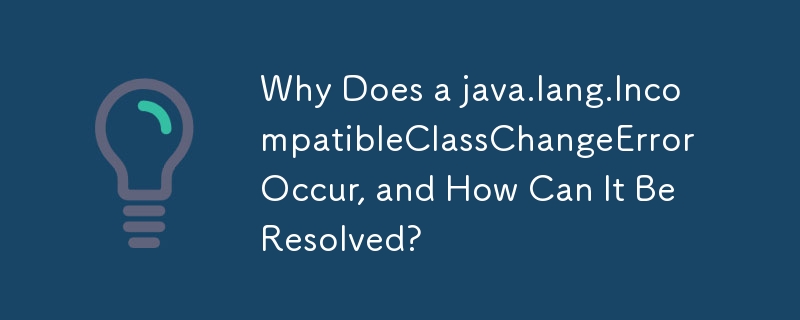 Java
Java
 javaTutorial
javaTutorial
 Why Does a java.lang.IncompatibleClassChangeError Occur, and How Can It Be Resolved?
Why Does a java.lang.IncompatibleClassChangeError Occur, and How Can It Be Resolved?
Why Does a java.lang.IncompatibleClassChangeError Occur, and How Can It Be Resolved?

Understanding the java.lang.IncompatibleClassChangeError
The java.lang.IncompatibleClassChangeError is a runtime error that occurs when there's a conflict between the class files present in the Java Virtual Machine (JVM) and the current version. This error is particularly troublesome when attempting to invoke methods from a JAR file that contains a Java library.
Causes of the Error
The most common cause of this error is incompatible binary changes introduced to the library without recompiling the client code. According to the Java Language Specification §13, any changes that alter non-static and non-private fields or methods to become static or vice versa can trigger this error.
Addressing the Issue
To resolve this error, it's necessary to recompile the client code against the latest version of the library. By doing so, the class files will be updated to match the new library specifications and eliminate the conflict that caused the error.
Maintaining Binary Backward Compatibility
For public libraries, it's essential to prioritize binary backward compatibility to prevent breaking existing applications. Avoiding incompatible binary changes, or communicating major version number increments before releasing changes that break backward compatibility, allows developers to smoothly update their dependencies without disrupting their applications.
The above is the detailed content of Why Does a java.lang.IncompatibleClassChangeError Occur, and How Can It Be Resolved?. For more information, please follow other related articles on the PHP Chinese website!

Hot AI Tools

Undresser.AI Undress
AI-powered app for creating realistic nude photos

AI Clothes Remover
Online AI tool for removing clothes from photos.

Undress AI Tool
Undress images for free

Clothoff.io
AI clothes remover

AI Hentai Generator
Generate AI Hentai for free.

Hot Article

Hot Tools

Notepad++7.3.1
Easy-to-use and free code editor

SublimeText3 Chinese version
Chinese version, very easy to use

Zend Studio 13.0.1
Powerful PHP integrated development environment

Dreamweaver CS6
Visual web development tools

SublimeText3 Mac version
God-level code editing software (SublimeText3)

Hot Topics
 1376
1376
 52
52
 How does Java's classloading mechanism work, including different classloaders and their delegation models?
Mar 17, 2025 pm 05:35 PM
How does Java's classloading mechanism work, including different classloaders and their delegation models?
Mar 17, 2025 pm 05:35 PM
Java's classloading involves loading, linking, and initializing classes using a hierarchical system with Bootstrap, Extension, and Application classloaders. The parent delegation model ensures core classes are loaded first, affecting custom class loa
 How do I implement multi-level caching in Java applications using libraries like Caffeine or Guava Cache?
Mar 17, 2025 pm 05:44 PM
How do I implement multi-level caching in Java applications using libraries like Caffeine or Guava Cache?
Mar 17, 2025 pm 05:44 PM
The article discusses implementing multi-level caching in Java using Caffeine and Guava Cache to enhance application performance. It covers setup, integration, and performance benefits, along with configuration and eviction policy management best pra
 How can I use JPA (Java Persistence API) for object-relational mapping with advanced features like caching and lazy loading?
Mar 17, 2025 pm 05:43 PM
How can I use JPA (Java Persistence API) for object-relational mapping with advanced features like caching and lazy loading?
Mar 17, 2025 pm 05:43 PM
The article discusses using JPA for object-relational mapping with advanced features like caching and lazy loading. It covers setup, entity mapping, and best practices for optimizing performance while highlighting potential pitfalls.[159 characters]
 How do I use Maven or Gradle for advanced Java project management, build automation, and dependency resolution?
Mar 17, 2025 pm 05:46 PM
How do I use Maven or Gradle for advanced Java project management, build automation, and dependency resolution?
Mar 17, 2025 pm 05:46 PM
The article discusses using Maven and Gradle for Java project management, build automation, and dependency resolution, comparing their approaches and optimization strategies.
 How do I create and use custom Java libraries (JAR files) with proper versioning and dependency management?
Mar 17, 2025 pm 05:45 PM
How do I create and use custom Java libraries (JAR files) with proper versioning and dependency management?
Mar 17, 2025 pm 05:45 PM
The article discusses creating and using custom Java libraries (JAR files) with proper versioning and dependency management, using tools like Maven and Gradle.



